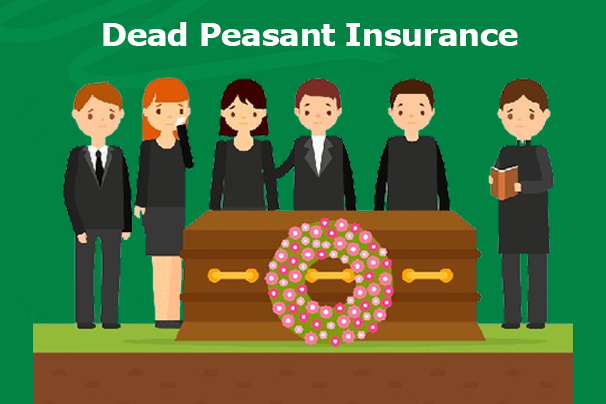Dead peasant insurance is a term that strikes a disturbing chord, referring to the practice where companies take out life insurance policies on their employees, with the corporation itself as the beneficiary. This system is officially known as corporate-owned life insurance (COLI). It has triggered a blend of ethical debate and controversy. On its surface, it may look like a practical approach for companies to have protection against the financial loss of losing important employees.

However, the reality is often more complex and morally ambiguous. Critics argue that it reduces human life to a balance sheet asset, benefiting companies financially upon an employee’s death. Sometimes without their consent or knowledge. This introduction aims to unravel the intricacies of dead peasant insurance. It also explores its implications, legal boundaries, and the ethical considerations it raises in the corporate world.
What is Dead Peasant Insurance?
Dead peasant insurance is a colloquial or informal term for corporate-owned life insurance, where a company purchases life insurance policies for its employees. It names itself as the beneficiary and collects the death benefit upon the death of the insured employee.
The term “dead peasant insurance” is considered derogatory. Plus, it reflects the controversial nature of the practice, particularly because it seems to place a financial value on employees’ lives for the benefit of the employer rather than the employees or their families.
How Does it Work?
To repeat, dead peasant insurance was formally known as corporate-owned life insurance. It involves a company purchasing life insurance policies for its employees. With the company itself acting as the policy owner and beneficiary. This practice was initially intended to protect companies financially from the loss of key employees whose deaths would significantly impact the business.
However, it has sometimes been applied to a broader range of employees, leading to ethical and regulatory inspections. Companies must now often obtain an employee’s consent before taking out a policy and must adhere to specific legal requirements. Such as informing the employee that they are being insured and the purpose of the insurance.
The premiums are paid by the company, and if an insured employee dies, the company receives the death benefit, which can be used at its discretion. The practice has faced criticism when it appears to exploit employees for financial gain without benefiting the employees or their families. Regulatory changes have aimed to ensure transparency and consent in the process.
What Does Dead Peasant Insurance Cover?
The primary coverage provided by dead peasant insurance is the death benefit that the company will receive when the insured employee passes away. This death benefit is meant to compensate the company for potential losses as a result of the death of the employee.
For instance, the costs of recruiting, hiring, and training a replacement and the loss of business during the adjustment period.
The policy does not provide any direct financial benefit to the employee’s family. Unless specifically designed to do so, which is not the standard practice for policies known as dead peasant insurance.
What Does It Not Cover?
Dead peasant insurance policies do not cover the personal expenses or financial needs of the deceased employee’s family. The policy is strictly a corporate asset, and its benefits are directed solely towards the company. It does not function as personal life insurance for employees, nor does it offer them or their beneficiaries any direct financial protection in the event of their death.
How Much Does Dead Peasant Insurance Cost?
The cost of dead peasant insurance varies widely depending on several factors, including the age, health, and role of the employee being insured. Also, the amount of coverage purchased; and the specific terms and conditions of the policy. Premiums can range from a few hundred to several thousand dollars per employee per year. Companies typically pay these premiums as part of their overall corporate expenses.
How to Obtain a Dead Peasant Insurance Policy
Getting a dead peasant insurance policy is very similar to other insurance policy types. Similarly, they involve several steps and careful consideration. Here is the guide you need if you are interested in obtaining this type of insurance:
Consent and Disclosure:
As a result of legal and ethical considerations, getting the explicit consent of the employees is an important step. Legislation like the Pension Protection Act of 2006 requires employers to talk to their employees about the policy and get their approval.
Eligibility Assessment:
Companies usually assess which employees are eligible for such insurance based on their contributions to the company’s success and financial stability. This often includes key executives and potentially other employees deemed crucial to operations.
Insurance Company Selection:
The company must then select an insurance provider that offers COLI products. This involves comparing terms, coverage options, and premiums to find the best fit for the company’s needs.
Application Process:
The company applies for life insurance policies on eligible employees, providing necessary personal and health information with employees’ consent.
Policy Management:
Once the policies are in place, the company must manage them as part of its financial assets. This includes paying premiums and possibly adjusting coverage as company needs and employee roles evolve.
This entire process requires careful consideration and decision-making to be able to get a suitable dead peasant insurance policy for your needs.
